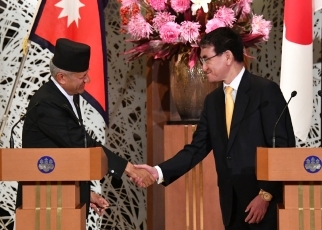Time Difference Between Nepal and Japan

Japan Standard Time (JST) is 3 hours and 15 minutes ahead of Nepal Standard Time (NPT).
- When it’s 12:00 PM (Noon) in Nepal 🇳🇵, it’s 3:15 PM in Japan 🇯🇵
- Nepal Time (NPT) = UTC +5:45
- Japan Time (JST) = UTC +9:00
This small time gap is convenient for communication, remote work, interviews, and day-to-day coordination, especially for students and SSW workers from Nepal working in Japan. The time difference between Nepal and Japan is exactly 3 hours and 15 minutes, with Japan being ahead. While this might seem minor, it plays a significant role in shaping the daily lives and routines of Nepali individuals living, studying, or working in Japan.
For instance, early morning activities in Japan are still late night in Nepal, making communication with families or coordinating virtual tasks slightly challenging but manageable. Nepali students in Japan must adapt to a more structured and punctual lifestyle—Japanese culture values time management highly, with classes, trains, and work starting precisely on schedule. For workers under the SSW visa, this time shift means adjusting their biological clock to earlier work hours and faster-paced routines. The Japanese workday often starts by 8 or 9 AM JST, which would feel like dawn for someone newly adjusting from NPT. However, over time, most Nepali individuals adapt well, and the slight time gap even helps with planning—off-hours communication with Nepal becomes possible after Japanese working hours. Overall, while the time difference requires an initial period of adjustment, it ultimately promotes discipline, time awareness, and efficiency, aligning well with Japan’s high standards of productivity.
Relationship Between Nepal and Japan

Nepal and Japan share a strong and long-standing friendship based on mutual respect, cultural exchange, and development cooperation.
The relationship between Nepal and Japan is a shining example of enduring diplomacy and genuine mutual respect. Established officially in 1956, the diplomatic ties between the two countries have grown into a robust partnership grounded in development assistance, cultural exchange, and shared values. The Government of Japan has been one of Nepal’s most generous development partners, supporting major sectors such as education, infrastructure, disaster resilience, healthcare, and energy.
Japan's technical expertise and financial aid have contributed to building schools, roads, and hospitals, especially after Nepal's 2015 earthquake. Beyond the official diplomatic front, the people-to-people relationship is even more heartfelt. Thousands of Nepali students, skilled workers, and caregivers now live in Japan, contributing to its economy while embracing Japanese discipline and culture. Similarly, the Japanese people admire Nepal’s rich spiritual heritage and natural beauty—Mount Everest and Lumbini (the birthplace of Buddha) attract many Japanese tourists and monks. Cultural festivals, friendship associations, and student exchange programs further reinforce the bond. From government agreements to everyday connections, the Nepal-Japan relationship is marked by trust, cooperation, and long-term friendship that continues to thrive across generations.
📌 Diplomatic Ties
Japan established diplomatic relations with Nepal in 1956. Since then, Japan has been a major development partner, helping Nepal in education, health, infrastructure, and disaster response.
🎓 Education & Scholarships
Many Nepali students pursue education in Japan under MEXT and other private scholarships. Japanese universities and language schools attract hundreds of Nepali students every year due to quality education and work opportunities.
🛠️ Employment & SSW Visa
Japan introduced the SSW (Specified Skilled Worker) Visa in 2019 to address its labor shortage. This has opened a new pathway for Nepali youth to work in skilled sectors like caregiving, hospitality, agriculture, and construction in Japan.
🌏 People-to-People Connection
There are active Nepali communities in Tokyo, Osaka, and other cities. Cultural events like “Nepal Festival Japan” and “Japan-Nepal Friendship Day” are celebrated annually to strengthen the bond.
Conclusion
Despite the 3 hour and 15 minute time difference, Japan and Nepal remain close in terms of collaboration, education, and economic opportunity. For students and SSW visa holders, understanding this time gap is crucial for virtual interviews, classes, or remote work coordination. The ongoing relationship between the two nations continues to grow stronger every year.